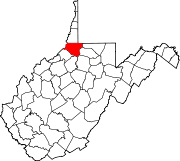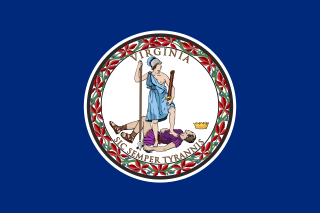
The governor of the Commonwealth of Virginia serves as the head of government of Virginia for a four-year term. The incumbent, Glenn Youngkin, was sworn in on January 15, 2022.

The Virginia Plan was a proposal to the United States Constitutional Convention for the creation of a supreme national government with three branches and a bicameral legislature. The plan was drafted by James Madison while he waited for a quorum to assemble at the Constitutional Convention of 1787.

In the context of the American Civil War (1861–65), the border states were slave states that did not secede from the Union. They were Delaware, Maryland, Kentucky, and Missouri, and after 1863, the new state of West Virginia. To their north they bordered free states of the Union, and all but Delaware bordered slave states of the Confederacy to their south.
In legislative procedure, a rider is an additional provision added to a bill or other measure under the consideration by a legislature, which may or may not have much, if any, connection with the subject matter of the bill.
Clinton v. City of New York, 524 U.S. 417 (1998), was a landmark decision by the Supreme Court of the United States in which the Court held, 6–3, that the line-item veto, as granted in the Line Item Veto Act of 1996, violated the Presentment Clause of the United States Constitution because it impermissibly gave the President of the United States the power to unilaterally amend or repeal parts of statutes that had been duly passed by the United States Congress. Justice John Paul Stevens wrote for the six-justice majority that the line-item veto gave the President power over legislation unintended by the Constitution, and was therefore an overstep in their duties.
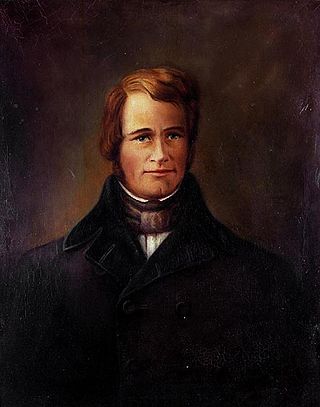
Thomas Walker Gilmer was an American statesman. He served in several political positions in Virginia, including election as the 28th Governor of Virginia. Gilmer's final political office was as the 15th Secretary of the Navy, but he died in an accident ten days after assuming that position.

The Readjuster Party was a bi-racial state-level political party formed in Virginia across party lines in the late 1870s during the turbulent period following the Reconstruction era that sought to reduce outstanding debt owed by the state. Readjusters aspired "to break the power of wealth and established privilege" among the planter elite of white men in the state and to promote public education. The party's program attracted support among both white people and African-Americans.

The West Virginia House of Delegates is the lower house of the West Virginia Legislature. Only three states—Maryland, Virginia and West Virginia—refer to their lower house as the House of Delegates.

The West Virginia Legislature is the state legislature of the U.S. state of West Virginia. A bicameral legislative body, the legislature is split between the upper Senate and the lower House of Delegates. It was established under Article VI of the West Virginia Constitution following the state's split from Virginia during the American Civil War in 1863. As with its neighbor and former constituent Virginia General Assembly, the legislature's lower house is also referred to as a "House of Delegates."

The West Virginia Senate is the upper house of the West Virginia Legislature. There are seventeen senatorial districts. Each district has two senators who serve staggered four-year terms. Although the Democratic Party held a supermajority in the Senate as recently as 2015, Republicans now dominate in the chamber, and holds 31 seats to the Democrats' three seats.

Harley Martin Kilgore was a United States senator from West Virginia.
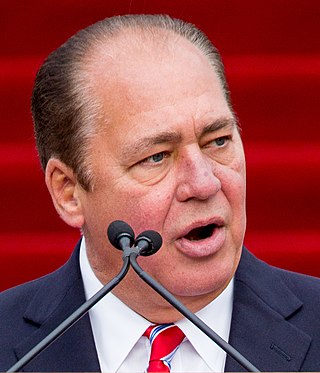
Earl Ray Tomblin is an American politician who served as the 35th governor of West Virginia from 2011 to 2017. A member of the Democratic Party, he previously served in the West Virginia Senate from 1980 to 2011 and as president of the West Virginia Senate from 1995 to 2011. Tomblin became acting governor in November 2010 following Joe Manchin's election to the U.S. Senate. He won a special election in October 2011 to fill the unexpired term ending in January 14, 2013 and was elected to a full term as governor in November 2012.

Terence Richard McAuliffe is an American businessman and politician who served as the 72nd governor of Virginia from 2014 to 2018. A member of the Democratic Party, he was co-chairman of President Bill Clinton's 1996 reelection campaign, chairman of the Democratic National Committee from 2001 to 2005 and chairman of Hillary Clinton's 2008 presidential campaign.

In the United States, a state is a constituent political entity, of which there are 50. Bound together in a political union, each state holds governmental jurisdiction over a separate and defined geographic territory where it shares its sovereignty with the federal government. Due to this shared sovereignty, Americans are citizens both of the federal republic and of the state in which they reside. State citizenship and residency are flexible, and no government approval is required to move between states, except for persons restricted by certain types of court orders.
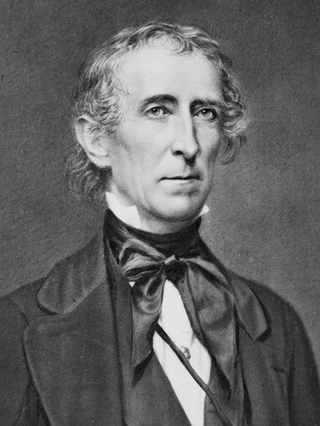
John Tyler was the tenth president of the United States, serving from 1841 to 1845, after briefly holding office as the tenth vice president in 1841. He was elected vice president on the 1840 Whig ticket with President William Henry Harrison, succeeding to the presidency following Harrison's death 31 days after assuming office. Tyler was a stalwart supporter and advocate of states' rights, including regarding slavery, and he adopted nationalistic policies as president only when they did not infringe on the states' powers. His unexpected rise to the presidency posed a threat to the presidential ambitions of Henry Clay and other Whig politicians and left Tyler estranged from both of the nation's major political parties at the time.

Gayle Conelly Manchin is an American educator and government official who was the First Lady of West Virginia from 2005 to 2010 and is the current Federal Co-Chair of the Appalachian Regional Commission. Manchin previously served as the president of the West Virginia Board of Education from 2013 to 2014 and West Virginia Secretary of Education and the Arts from 2017 until her termination in March 2018. She is the wife of former governor and current U.S. Senator Joe Manchin of West Virginia.

William Paul Cole III is an American businessman, politician and a former Republican member of the West Virginia Senate, representing the 6th district from 2013 to 2017. He was the President of the Senate from 2015 to 2017. Cole also served in the West Virginia House of Delegates from May 28, 2010, to January 12, 2011, to fill the vacancy caused by the resignation of Delegate John Shott.
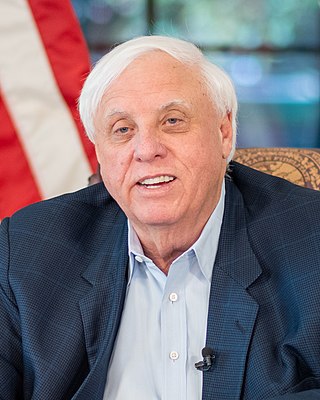
James Conley Justice II is an American businessman and politician who has served as the 36th governor of West Virginia since 2017. Justice was once a billionaire, but his net worth had declined to $513.3 million as of 2021. He inherited a coal mining business from his father and built a business empire with 94 companies, including the Greenbrier, a luxury resort in White Sulphur Springs.

The 1994 Virginia State Elections took place on Election Day, November 8, 1994, the same day as the U.S. Senate and U.S. House elections in the state. The only statewide elections on the ballot were three constitutional referendums to amend the Virginia State Constitution. Because Virginia state elections are held on off-years, no statewide officers or state legislative elections were held. All referendums were referred to the voters by the Virginia General Assembly.

The 1980 Virginia State Elections took place on Election Day, November 4, 1980, the same day as the U.S. Presidential and U.S. House elections in the state. The only statewide elections on the ballot were four constitutional referendums to amend the Virginia State Constitution. Because Virginia state elections are held on off-years, no statewide officers or state legislative elections were held. All referendums were referred to the voters by the Virginia General Assembly.

















